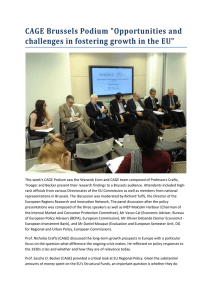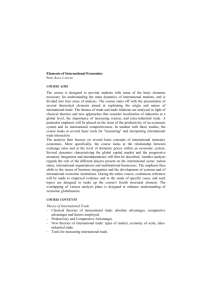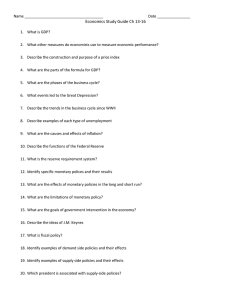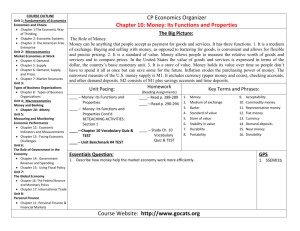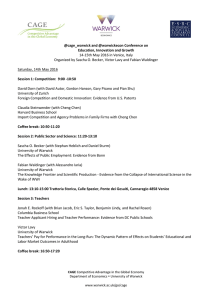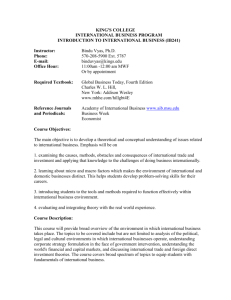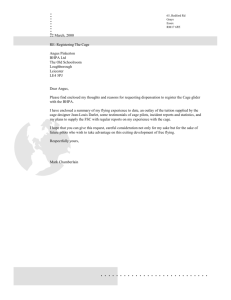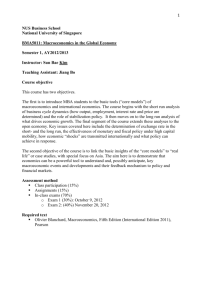Brexit? Economic Perspectives on Britain’s EU Membership
advertisement
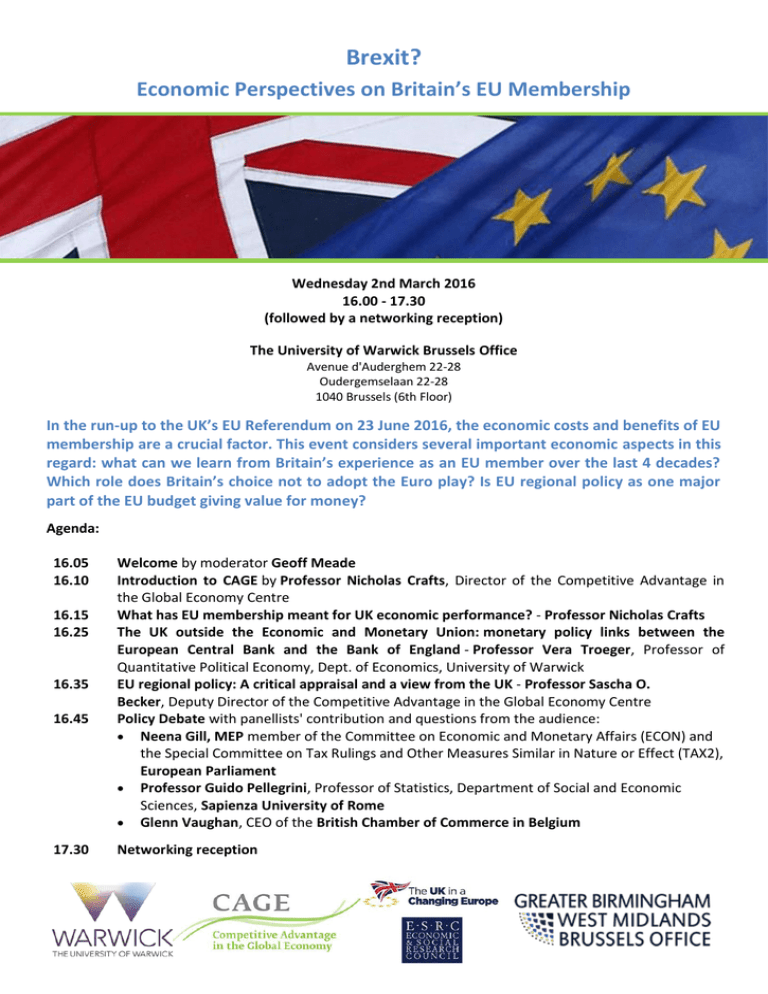
Brexit? Economic Perspectives on Britain’s EU Membership Wednesday 2nd March 2016 16.00 - 17.30 (followed by a networking reception) The University of Warwick Brussels Office Avenue d'Auderghem 22-28 Oudergemselaan 22-28 1040 Brussels (6th Floor) In the run-up to the UK’s EU Referendum on 23 June 2016, the economic costs and benefits of EU membership are a crucial factor. This event considers several important economic aspects in this regard: what can we learn from Britain’s experience as an EU member over the last 4 decades? Which role does Britain’s choice not to adopt the Euro play? Is EU regional policy as one major part of the EU budget giving value for money? Agenda: 16.05 16.10 16.15 16.25 16.35 16.45 17.30 Welcome by moderator Geoff Meade Introduction to CAGE by Professor Nicholas Crafts, Director of the Competitive Advantage in the Global Economy Centre What has EU membership meant for UK economic performance? - Professor Nicholas Crafts The UK outside the Economic and Monetary Union: monetary policy links between the European Central Bank and the Bank of England - Professor Vera Troeger, Professor of Quantitative Political Economy, Dept. of Economics, University of Warwick EU regional policy: A critical appraisal and a view from the UK - Professor Sascha O. Becker, Deputy Director of the Competitive Advantage in the Global Economy Centre Policy Debate with panellists' contribution and questions from the audience: Neena Gill, MEP member of the Committee on Economic and Monetary Affairs (ECON) and the Special Committee on Tax Rulings and Other Measures Similar in Nature or Effect (TAX2), European Parliament Professor Guido Pellegrini, Professor of Statistics, Department of Social and Economic Sciences, Sapienza University of Rome Glenn Vaughan, CEO of the British Chamber of Commerce in Belgium Networking reception What has EU Membership meant for UK economic performance? By Professor Nicholas Crafts The presentation will focus on implications for the growth of the UK economy from its EU membership. It is argued that there has been a substantial positive effect on the level of GDP per person, but not on the rate of growth. The income gain far exceeds both the ‘membership fee’ and the ex-ante expectations of economists in the 1970s. The positive effect comes because the EU has been far more effective than European Free Trade Association in achieving deep economic integration and higher volumes of trade. A particularly important influence on UK productivity performance has come through the increased competition associated with the reduction in trade costs consequent on EU membership. Further positive effects can be expected if greater economic integration reduces non-tariff barriers in future. Brexit would likely entail giving up some but not necessarily all of these gains. The UK outside the Economic and Monetary Union: monetary policy links between the European Central Bank and the Bank of England By Professor Vera Troeger We argue that the European Currency Union reduced the de facto monetary policy autonomy of EU countries abstaining from introducing the Euro like the UK. The presentation hinges on the trade-off between monetary policy autonomy in order to counterbalance country specific economic shocks and the need for a stable exchange rate with the main trading partner, in this case the Eurozone, in order to avoid the import of inflation or a declining competitiveness of the domestic industry. The empirical analysis shows that in “normal” times the latter policy goal (exchange rate stability) dominates the first (counterbalancing economic shocks). Analysing the short-term adjustments of central bank interest rates in three EU countries which did not introduce the Euro (UK, Sweden and Denmark), we show that these countries’ monetary policies more closely follow the ECB’s policy than they had followed the Bundesbank’s policy before 1994. In times of economic crises the balance might be shifted towards counterbalancing economic shocks. We therefore use data from the recent economic crisis to analyse whether monetary policy in the UK diverges to a larger extend from EMU monetary policy when a financial crisis affects the domestic economy. EU Regional Policy: A critical appraisal and a view from the UK By Professor Sascha O.Becker Regional Policy makes up a major part of the EU budget and the public often raises the question whether “Brussels” spends EU taxpayer money wisely. The presentation will include an analysis of the EU Regional Policy during four programming periods: 1989-1993, 1994-1999, 2000-2006, 2007-2013. When looking at all periods, the focus is on the growth, employment and investment effects of objective treatment status. For the two later periods, we additionally look at the effects of the volume of EU transfers, overall and in sub-categories, on various outcomes. We also pay attention to the role of EU funding for UK regions and relate this to the debate on Britain's In/Out referendum. SPEAKER BIOGRAPHIES CAGE TEAM MODERATOR Professor Nicholas Crafts Mr Geoff Meade Nicholas Crafts is Professor of Economics and Economic History at the University of Warwick and Director of CAGE. His main fields of research interest are the comparative economic performance of European economies and the economic geography of industrialisation. Professor Vera Troeger Vera E. Troeger is Professor of Quantitative Political Science at the Economics Department and the Department for Politics and International Studies at the University of Warwick and is Research Associate at CAGE. She obtained her PhD from the Max Planck Institute of Economics and the University of Konstanz in 2006. Her research interests lie at the intersection of international and comparative political economy, econometrics, and applied statistics. Geoff Meade has been covering EU affairs from Brussels for the Press Association, the UK and Ireland's national news agency since 1979, and is also a European correspondent for Deutsche Welle Television. As well as reporting on every aspect of the EU’s activities for the past 34 years, he is also a wellknown columnist who has featured in The Bulletin, European Voice, E!Sharp and Together magazine; published his first book, ‘All in a Day’s Shirk’, in 2009; and is the author and star of the annual Brussels Press Revue. Geoff is a highly engaging and entertaining public speaker and can provide light-hearted comedy suitable for after-dinner entertainment at corporate events. He is also an experienced moderator of conferences and seminars on EU affairs, and provider of media training courses. PANELLISTS Ms Neena Gill Professor Sascha O. Becker Sascha O. Becker is Professor of Economics at the University of Warwick and the Research Director for CAGE. He obtained his PhD from the European University Institute, Florence, in 2001. His main fields of research interest are education and labour economics, public economics and economic history. 3rd term Labour Member of the European Parliament for the West Midlands, UK. Serving on the Economic and Monetary Affairs Committee; Taxe Committee; Foreign Affairs Committee; First Vice-President to the Delegation for Relations with India; member US Delegation, ASEAN Delegation and ACP-EU Joint Parliamentary Assembly. Previously President of Delegation for Relations with India, President (2004–2007) of Delegation for Relations with South Asia and SAARC countries, Vice President (2002–2004) of Delegation for Relations with South Asia, ASEAN and SAARC countries. Formerly, Vice President SAS Software Company; Former CEO of 2 social housing organisations, and Graduate of Social Sciences and alumni of London Business School. About the Centre on Competitive Advantage in the Global Economy (CAGE) Professor Guido Pellegrini The centre’s research programme is focused on how countries succeed in achieving key economic objectives such as improving living standards, raising productivity, and maintaining international competitiveness, which are central to the economic wellbeing of their citizens. Full Professor in Statistical Methods for Regional Policies and Statistics at Sapienza University of Rome (Italy). Previously he was Economist at the Research Department of Bank of Italy, where he managed the Regional Analysis Unit. He participated to several Committees and Study Groups of Ministers and Public Administrations, in Italy and abroad. His main research interests concern policy evaluation, economic growth and convergence, local development, economic statistics. Mr Glenn Vaughan As Chief Executive of the British Chamber of Commerce in Belgium since 2008, Glenn has focused on driving value-added for member companies. As a result, the chamber has grown consistently to become a leading network for international business, and multiple award winner. He works with major international companies and senior decision makers on policies affecting the environment for business, as well as helping to grow British-Belgian-European business, trade and investment. During 20 years’ experience in Brussels, Glenn has advised regional development agencies, scientific organizations and businesses on EU policy and funding. He was part of the small Brussels team that successfully lobbied for €2bn EU funding for Wales and was later MD of the Brussels-based Welsh representation until 2005. Established in January 2010, CAGE is a research centre in the Department of Economics at the University of Warwick. Funded by the Economic and Social Research Council (ESRC), CAGE is carrying out a 5 year programme of innovative research. Our research analyses the reasons for economic outcomes both in developed economies like the UK and emerging economies such as China and India. We aim to develop a better understanding of how to promote institutions and policies which are conducive to successful economic performance and endeavour to draw lessons for policy makers from economic history as well as the contemporary world. Research at CAGE examines how and why different countries achieve economic success. CAGE defines ‘success’ in terms of well-being as well as productivity. The research uses economic analysis to address realworld policy issues. The centre is distinctive in providing a perspective that draws on economic history as well as economic theory and is applied to countries at various different stages of economic development. Research is organised under four themes: What explains comparative long-run growth performance? How do culture and institutions help to explain development and divergence in a globalising world? How can the measurement of wellbeing be improved and what are the implications for policy? What are the implications of globalisation and global crises for policymaking and for economic and political outcomes in western democracies?
